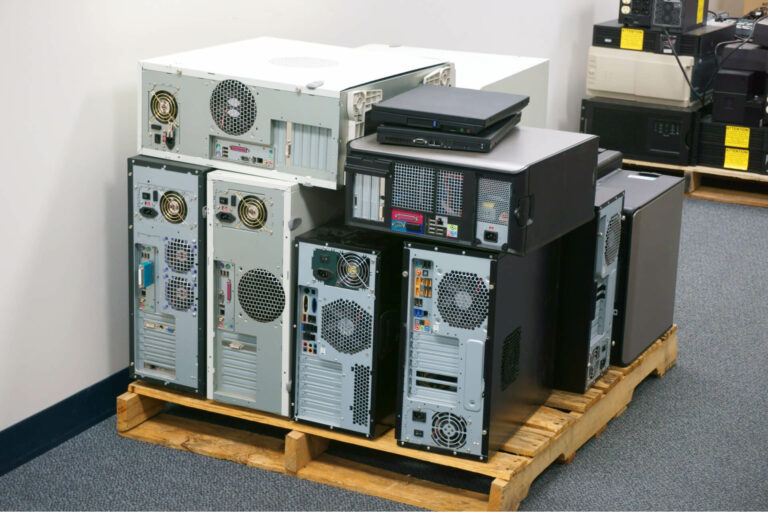How Schools Can Benefit from Computer Recycling Programmes
Recycling in schools can have a significant positive impact on the environment and on students’ learning experiences. According to Recycle Now, the average primary school in the UK produces 45kg of waste per pupil each year, with up to 78% of that waste being recyclable or compostable. By implementing recycling programmes in schools, educators can educate pupils about the importance of recycling, reduce waste sent to landfills, and contribute to a more sustainable future.
Key Takeaways:
- School computer recycling programmes help educate students about responsible waste management.
- Implementing recycling initiatives reduces waste sent to landfills and promotes sustainability.
- Educating students about recycling can inspire them to adopt eco-friendly habits in their daily lives.
- Responsible e-waste disposal in schools protects sensitive data and reduces environmental harm.
- Investing in computer recycling programmes contributes to a more sustainable future.
The Importance of Recycling in Schools
Recycling in schools plays a vital role in promoting sustainability and educating pupils about responsible waste management. By incorporating recycling programs into the school curriculum, educators have the opportunity to teach students about the importance of recycling and encourage them to develop lifelong habits of responsible waste disposal. This not only benefits the environment but also empowers students to become environmental stewards in their everyday lives.
One of the key reasons why recycling in schools is important is its positive impact on the environment. By diverting materials from landfills, recycling reduces the amount of waste that ends up polluting the environment. It also helps in conserving resources and reducing energy consumption and greenhouse gas emissions associated with the production of new materials. Through recycling, schools can contribute to a more sustainable future and teach students the importance of protecting the planet.
“Recycling in schools is not just about waste management; it is about instilling values and creating a culture of environmental responsibility among students.” – School Sustainability Coordinator
In addition to its environmental benefits, recycling in schools also contributes to a positive school image. Schools that prioritize recycling and sustainable practices are seen as responsible institutions that care about the well-being of the planet and future generations. This can attract environmentally conscious parents and students who value eco-friendly initiatives and are more likely to support schools with a strong commitment to sustainability.
By embracing recycling programs, schools can educate pupils about responsible waste management, reduce their environmental impact, and create a positive school image. It is essential for schools to prioritize recycling and incorporate it into their daily operations to foster a culture of sustainability among students and set an example for future generations.
Types of Waste in Schools
Schools generate different types of waste, including food waste, paper waste, plastic waste, and electronic waste. According to WRAP, education catering in the UK produces 123,000 tonnes of food waste each year, with much of it coming from school lunchrooms. Paper waste is also a significant issue in schools, with up to one million sheets of paper being used per school per year. Plastic waste, particularly from cafeteria items such as straws and single-use packaging, is another major challenge. Finally, electronic waste is an increasingly concerning issue, with old computers and other devices often being discarded improperly.
“Schools in the UK generate thousands of tonnes of food waste annually, much of which can be recycled or composted. By implementing effective waste management practices, schools can significantly reduce food waste and contribute to a more sustainable environment.”
Awareness about these different types of waste is crucial for schools to understand the scale of the problem and take appropriate action. By addressing food waste, paper waste, plastic waste, and electronic waste, schools can make a positive impact on the environment and instill responsible waste management practices in their students.
Food Waste
Food waste is a pressing issue in schools, with an alarming amount of food being thrown away each year. Implementing strategies such as composting, meal planning, and educating students about portion control and the importance of reducing food waste can help schools tackle this problem effectively.
Paper Waste
Excessive paper usage is another major waste issue in schools. By implementing digital alternatives, promoting double-sided printing, and encouraging teachers and students to use recycled paper, schools can significantly reduce paper waste and minimize their environmental impact.
Plastic Waste
Plastic waste, including single-use packaging and other cafeteria items, is a growing concern in schools. Implementing initiatives such as reusable water bottle programs, replacing plastic cutlery with reusable alternatives, and educating students about the environmental consequences of plastic waste can help schools reduce their plastic footprint.
Electronic Waste
With technology becoming an integral part of education, the disposal of electronic waste is a critical issue. Schools should prioritize proper recycling and disposal methods for old computers and other electronic devices to prevent them from ending up in landfills and causing environmental harm.
| Types of Waste | Challenges | Solutions |
|---|---|---|
| Food Waste | Large amount of food waste generated in school lunchrooms | Implementing composting programs, educating students about portion control, and meal planning |
| Paper Waste | Excessive paper usage in classrooms | Promoting digital alternatives, double-sided printing, and using recycled paper |
| Plastic Waste | Single-use plastic packaging and cafeteria items | Introducing reusable water bottle programs, replacing plastic cutlery with reusable alternatives, and educating students about the environmental impact of plastic waste |
| Electronic Waste | Improper disposal of old computers and electronic devices | Prioritizing proper recycling and disposal methods for electronic waste |
Ways Schools Can Reduce Waste
Schools play a crucial role in promoting sustainable practices and teaching students about responsible waste management. By implementing various strategies, schools can actively reduce waste and create a more environmentally friendly learning environment. Here are some effective ways that schools can reduce waste:
Create Class Involvement
Engaging students in environmental initiatives is a powerful way to raise awareness and promote waste reduction. Encourage class involvement by organizing activities such as scavenger hunts for recyclable materials or challenges to bring waste-free lunches. These activities not only educate students about the importance of recycling but also foster a sense of responsibility towards the environment.
Implement a Composting Scheme
Food waste is a significant issue in schools, but it can be effectively managed through composting schemes. Set up compost bins or designated areas where food waste can be collected and composted. This not only reduces the amount of waste sent to landfills but also teaches students about the natural cycle of decomposition and the importance of organic waste management.
Install Recycling Bins
Proper waste disposal is crucial for effective recycling. Place recycling bins throughout the school, ensuring they are accessible and clearly labeled. By making it convenient for students and staff to recycle, you encourage proper waste separation and recycling practices. Consider having separate bins for different types of recyclables, such as paper, plastic, and cans, to facilitate easy sorting.
Provide Staff Training
Training staff members on waste reduction and recycling practices is essential for creating a culture of sustainability in schools. Educate teachers and other school staff about the importance of waste reduction and recycling, as well as the proper procedures for waste disposal. This training ensures that everyone is on board and actively participating in waste management initiatives.
| Benefits of Waste Reduction in Schools | |
|---|---|
| Environmental sustainability | By reducing waste, schools contribute to a greener future and help protect the environment. |
| Cost savings | Efficient waste management practices can lead to cost savings for schools. |
| Positive school image | Implementing waste reduction initiatives can enhance the school’s reputation and attract environmentally conscious parents and students. |
| Educational opportunities | Reducing waste provides valuable learning experiences for students, teaching them about environmental stewardship and responsible citizenship. |
By implementing these waste reduction strategies, schools can make a significant impact in creating a sustainable and eco-friendly learning environment. Through class involvement, composting schemes, recycling bins, and staff training, schools can foster a culture of waste reduction and instill lifelong habits of responsible waste management in their students.

Responsible E-Waste Disposal in Schools
Responsible e-waste disposal is of paramount importance in schools to protect the environment and ensure data security. With the rapid advancement of technology, schools often find themselves dealing with outdated computers and other electronic devices. Instead of allowing these items to end up in landfills, schools can take proactive steps to responsibly dispose of e-waste through recycling programs.
By participating in e-waste recycling, schools can minimize their carbon footprint and contribute to a more sustainable future. Recycling end-of-life electronic assets prevents toxic materials from leaching into the soil and water, reducing environmental harm. Additionally, responsible e-waste recycling promotes energy conservation and reduces greenhouse gas emissions associated with manufacturing new devices.
In addition to the environmental benefits, proper e-waste recycling also ensures data security. Schools handle sensitive data, including student records, financial information, and intellectual property. The disposal of electronic devices without proper data destruction can pose a significant risk. By engaging in certified IT asset destruction (ITAD) processes, schools can safeguard sensitive information and protect against potential data breaches.
The Benefits of Reducing E-Waste in Schools
Reducing e-waste in schools through responsible disposal practices offers numerous benefits. Firstly, it sets a positive example for students and teaches them the importance of sustainable practices. By witnessing the school’s commitment to responsible e-waste management, students are more likely to adopt eco-friendly habits in their own lives.
“Schools have a crucial role to play in educating the next generation about environmental stewardship and responsible waste management.”
Furthermore, responsible e-waste recycling can potentially generate economic returns. Refurbishing old electronic devices can provide schools with an opportunity to recover some of the initial investment or technology budget. These funds can be reinvested in educational resources or sustainability initiatives.
In conclusion, it is essential for schools to prioritize responsible e-waste disposal through recycling programs. By doing so, schools can contribute to a more sustainable future, protect sensitive data, and inspire students to become environmental stewards. Sustainable practices should be ingrained within the fabric of education, ensuring that future generations are equipped with the knowledge and skills to create a more sustainable world.
| Benefits of Responsible E-Waste Disposal |
|---|
| Minimizes the school’s carbon footprint |
| Protects sensitive data through proper data destruction |
| Reduces environmental harm from toxic materials |
| Conserves energy and reduces greenhouse gas emissions |
| Sets a positive example for students |
| Potential economic returns through refurbishment |
Conclusion
School computer recycling programs play a crucial role in promoting school sustainability and educating students about responsible waste management. By implementing recycling initiatives, schools can minimize their environmental impact and contribute to a more sustainable future. Recycling in schools not only reduces carbon footprint but also prevents valuable materials from ending up in landfills, leading to a significant positive impact on the environment.
Moreover, responsible waste management practices extend beyond recycling, as schools can also play a vital role in protecting sensitive data. Through certified IT asset destruction (ITAD) processes, schools can ensure proper data security and disposal of electronic waste (e-waste), setting a positive example for students on the importance of sustainable practices.
By investing in school computer recycling programs, schools not only demonstrate their commitment to environmental stewardship but can also save money through efficient waste management practices. These initiatives inspire students to adopt responsible waste management habits, forming a foundation for lifelong eco-friendly practices. Through education and action, schools can foster a culture of responsible waste management and contribute to a more sustainable future for all.
FAQ
How can recycling in schools benefit the environment and students?
Recycling in schools can educate students about the importance of recycling, reduce waste sent to landfills, and contribute to a more sustainable future.
What types of waste are generated in schools?
Schools generate food waste, paper waste, plastic waste, and electronic waste.
How can schools reduce waste and promote recycling?
Schools can involve students in environmental initiatives, set up composting schemes, place recycling bins throughout the school, and provide staff training on waste reduction and recycling practices.
Why is responsible e-waste disposal important in schools?
Responsible e-waste disposal prevents environmental harm, protects sensitive data, and sets a positive example for students on the importance of sustainable practices.
How do school computer recycling programs promote sustainability?
School computer recycling programs help reduce the carbon footprint, prevent materials from going to landfills, and inspire students to adopt eco-friendly habits.















